Starting kindergarten means lots of changes and a BIG transition for young children…and their parents! For many children, it will mean leaving preschool and starting “real school” for big kids. For some children, it will mean leaving home for the first time on a regular basis. Either way, kindergarten is a new beginning—the start of a child’s formal education that will last for at least 13 years.
Children may be wondering about their school, their teacher, and their classmates. They will want to know more about their classroom, the playground, the daily schedule. And they may be worried about being away from home and from their parents, about where they will sit and what they will do all day, where the bathroom is, and what happens at recess.
There is so much to learn and so much to find out. This is an exciting time for young children and their families. Parents can help children look forward to the first day of school—and all the years to come— by helping them get ready for school and by becoming informed themselves.
What is Kindergarten Readiness?
When children enter kindergarten at age five, they are still growing and developing. Each child has been raised in a unique environment, and will have individual strengths and weaknesses. Very few children will have all of the school readiness skills when kindergarten begins. But experts agree that, to be most successful, children will have a balance of skills in each of four “Building Blocks of School Readiness”:
Health and Fuel for School: A child who is ready for school is healthy, active, eats a nutritious diet and is well-rested. Immunizations are up-to-date, the child has visited the dentist and has good oral health. The child has strong gross motor skills including walking, running, hopping, and climbing; the child also has fine motor skills including use of pencils, crayons, paint brushes, and scissors. A child who is ready for school can also button or zip clothes, tie or Velcro shoes, and use the toilet, wash hands, and blow his nose by himself.
Parents can help by: ensuring that children get 10 to 12 hours of sleep, eat a balanced diet including a healthy breakfast, limiting television, providing time for using crayons and pencils to draw and color, making sure that children get regular physical activity, and by getting regular dental and medical check-ups.
Use Your Words: Language skills are thinking skills and learning skills. In kindergarten, the teacher will use words to give directions and ask questions, to describe things, to help children think about new concepts, and to learn new ideas and information. The more children hear words and ideas and practice using them, the better they will be at learning in school. A child who is ready for school hears and understands words, stories and songs, uses words to communicate what she thinks or wants or needs, speaks clearly and can be understood, and uses complete sentences and connects ideas together.
Parents can help by: reading with their children every day and visiting the library, asking questions and listening carefully to children’s answers, speaking clearly and avoiding slang or swear words, playing story-telling games, including children in appropriate family conversations, describing people, places and things, and encouraging children to “use their words” (in a complete sentence) to ask for things or to share an idea—rather than just pointing or whining or saying a single word.
Sharing and Caring: For many young children, the kindergarten classroom may be their first time interacting in a large group…and that group is going to be there every day! A major part of kindergarten readiness is being able to be part of this group–having self control as an individual and being to participate with two or more other children as well as with the entire class. A child who is ready for school takes turns, shares and helps others, tries new activities and asks questions, talks to adults and can ask for help, can follow one and two-step directions (“put away your crayons and bring me your paper”), pays attention and stays focused for 10 to 15 minutes, listens and sits still (for story time etc.), and can “work” and play independently and with others.
Parents can help by: arranging “play dates” or other opportunities for children to play with others in the months before kindergarten starts, offering praise for behaviors that are good for kindergarten as well as reminders for those that aren’t, encouraging sharing and caring about others’ feelings, setting limits and explaining them, helping children talk about their feelings and encouraging their questions, and by setting a good example for thoughtful behavior.
ABCs and 123s: While many child development experts downplay the importance of having children memorize the alphabet before kindergarten or be ready to count to 20, these skills will certainly become an important part of kindergarten learning. By the end of kindergarten, children will be well on their way to reading and will be starting to write their own sentences. They will learn to tell time, to add and subtract. A child who is ready for school can count ten objects, knows shapes and colors, knows the letters of the alphabet and can write his or her own first name, knows simple rhyming words, and knows how to “use” a book (where to start, turning the pages, understands that the pictures and words tell the story). Stop by First 5 to receive a free book for your children ages 0-5, offered by First Book.
Parents can help by: pointing out (or asking about) letters and numbers during the day, pointing out (or asking about) colors and shapes, counting together, singing and saying the alphabet, reading and/or looking at books together, playing memory games and rhyming games, keeping pencils and paper available and making time for children to practice writing their names, letters, and numbers.
Parents can ease the fear factor on the first day of kindergarten by making sure it’s not the first time children have seen their school. Whenever you drive by the school during the summer say, “There’s your school!”. Tell your child about the school and encourage her to ask questions. Take the time to walk around or through the school. Peek in the classroom windows, visit the playground, and find the office. Practice walking to school; or, if your child will be riding the bus, practice by riding the city or county bus. All these preparations will help your child be excited to go to school and feel more comfortable on the first day.
TK & Kindergarten Enrollment 2025
If your child will be turning five on or by September 1, 2025, they are eligible for Kindergarten for School Year 2025-26. If your child is turning four on or by September 1, 2025, they are eligible for Transitional Kindergarten at your local school. At Enrollment, parents, and children can tour the school, meet teachers and classmates, and register for TK & Kindergarten. Check our calendar, click here, or contact your elementary school for Kindergarten Enrollment dates the spring before your child starts school.
Ready…Set…Learn!
Since the Kindergarten year lays the foundation for future success in learning, both parents and teachers are anxious for children to get a good start in school. These ideas and activity-packed booklets provide numerous suggestions to help your child get off to a good start.
For more information, please contact:
Mammoth Unified School District 760-934-6802
Eastern Sierra Unified School District 760-932-7443
or
First 5, 760-924-7626


